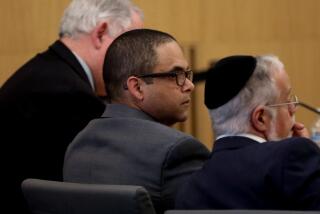Kelly Thomas’ last words close prosecution’s case against officers
The final words of a 37-year-old homeless man filled the packed Orange County courtroom.
“Dad help me.”
“God help me.”
“Help me. Help me. Help me.”
Orange County Dist. Atty. Tony Rackauckas let Kelly Thomas’ voice provide an emotional undertone to his closing arguments Tuesday in a widely watched criminal case against a pair of Fullerton police officers accused of killing the homeless man in a furious beating on a summer night in 2011.
“I don’t know about you,” Rackauckas told jurors, “but I can’t recall ever hearing such pleas. Such crying. Such begging for his life. Ever.”
The surveillance video that captured the beating — coupled with an audio recording from devices the officers were wearing — has been shown repeatedly during the trial, with each side in the proceedings drawing a far different conclusion about what it shows.
Prosecutors contend the raw, black-and-white tape captured an unjustified beating that ends with Thomas crumpled on the ground in a pool of his own blood. Attorneys for the former officers, though, say its shows a homeless man fighting off officers so vigorously that they were repeatedly forced to call for backup units.
Jurors, who are now weighing the fate of former officers Manuel Ramos and Jay Cicinelli, will also have to wrestle with the question of what actually killed the homeless man: the police beating, as prosecutors contend, or, as defense attorneys suggest, a diseased heart damaged by years of drug use.
Rackauckas said Ramos was a bully who wanted to hurt Thomas, and Cicinelli crossed the line when he used his stun gun to hit the mentally ill homeless man in the face.
Orange County’s top prosecutor focused on what he said was a turning point in Thomas’ encounter with the police: Ramos slipping on a pair of latex gloves as he tells Thomas, “See these fists?.... They’re getting ready to ---- you up.”
Rackauckas said Ramos’ threatening words and provocative actions turned a routine police encounter into a crime scene. The prosecutor said that once the officer threatened Thomas, the homeless man had a right to defend himself.
In the video, Thomas can be seen standing up and backing away from Ramos. Within seconds, Ramos and another officer begin swinging their batons at him.
Cicinelli can be seen arriving at the scene as the two officers struggled with Thomas on the ground. The video shows Cicinelli using his Taser multiple times to stun Thomas and then finally smacking the homeless man in the face with it.
“I just probably smashed his face to hell,” Cicinelli is heard saying after the struggle.
Cicinelli is charged with involuntary manslaughter and excessive force under color of authority, Ramos with second-degree murder and involuntary manslaughter.
But defense attorney John Barnett said Ramos had no way of knowing that his threat would lead to Thomas’ death, a point he said prosecutors have to prove to win a murder conviction.
“That’s the beginning of the people’s case, and really, that’s the end,” Barnett said. “His words were not any different than ‘If you don’t comply with my lawful order, then I’m going to use all force necessary to make you comply.’”
Barnett also referred to Thomas’ violent past during his closing arguments — throwing rocks at a fruit vendor, striking his grandfather with a fireplace poker, choking his mother outside their home.
The officers who tried to subdue Thomas on the July night in Fullerton were dealing with a violent and erratic man, Barnett said.
“This wasn’t about some bully cop who was trying to beat down a homeless guy,” Barnett said. Ramos “did not kill Kelly Thomas, he did not use excessive force.”
Barnett also questioned whether the prosecution proved its contention that Thomas died because his chest was compressed during the altercation with police.
He pointed to the testimony of a defense expert who said Thomas’ death was caused by an enlarged heart resulting from previous methamphetamine use. He also said that medical records showed that hospital personnel had a difficult time inserting a breathing tube into Thomas’ throat, which could have killed him.
The Orange County coroner’s office determined that Thomas died of brain damage from lack of oxygen caused by chest compression and other injuries suffered during his struggle with police
“What does all this medical testimony tell you?” Barnett asked. “There’s like an active controversy among leading minds in the country in these fields. So they can’t agree. They can’t agree.”
Closing arguments will continue Wednesday and the case is likely to go to the jury by day’s end.
More to Read
Start your day right
Sign up for Essential California for news, features and recommendations from the L.A. Times and beyond in your inbox six days a week.
You may occasionally receive promotional content from the Los Angeles Times.








